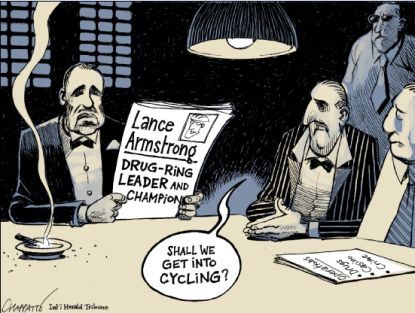
International,
Herald Tribune, France
[Click Here for More Cartoons]
Lance Armstrong
Gives Italians Sense of Legal Superiority (La Stampa,
Italy)
"When Prime
Minister Monti, saying he feared thievery, refused to
endorse Romeís bid to host the Olympic Games, he wasn't wrong: it has been
years since a major event hasn't ended up in the cross-hairs of the judiciary.
... it is no coincidence that the great betting and match-fixing scandals have emerged only when magistrates made their move. Yet even in this sordid scenario there is a consolation. ... In Italy, the
fight against doping makes no concessions: if Armstrong had lived in Italy, he may have been caught faster that in
the United States."
By Marco Ansaldo
†††††††††††††††††††††††
††††††††
Translated By Alessandro Marsiglio
October 18, 2012
Italy
- La Stampa - Original Article (Italian)
When you say that sport is in the hands of the
prosecutors, one must clarify whether you mean managers taking
care of the athletes or investigating magistrates in the 18 prosecutors offices
of the Italian Republic. As our report demonstrates, there is no nation that
gives the legal system as much work to do as Italy. Do a little digging, and you
can find anything: from doping in sports, to fraudulent bankruptcy, to false
citizenship claims by immigrants who scam passports that their
children cannot obtain until age 18 - even if they are born in Italy. Ours is a
desolate map that confirms how sport goes hand-in-hand with the current in the
rest of the country, despite its self-deception about being a cut above.
Like
Worldmeets.US on Facebook
Why should it be any different? If the message that
emerges from society is that money and success are what matters most -
regardless of the shortcuts you take to get there, why wouldn't it have an
impact on a world in which people fight to win more than any other? If anything,
we should be surprised that more donít fall into temptation, and that there are
as many decent managers and young people following the rules as there are,
who accept the sacrifices that sport so often demands. Because whatever
discipline you choose, you have to be a full-time professional in order to
succeed, and run the risk that at the age of 30, you won't have amounted
to much.
Posted by Worldmeets.US
One problem is that commercialism has heavily penetrated
sport - and with the money comes speculators. People all-too-often close their
eyes so as not to see. In football, for example, the number of managers with criminal
convictions is alarming, yet some even hold institutional roles. Other federations
are no better. When Prime Minister Monti, saying he feared
thievery, refused to endorse Romeís bid to host the Olympic Games, he wasn't
wrong: it has been years since a major event hasnít ended up in the cross-hairs
of the judiciary.
YOUR DONATION MAKES OUR WORK AS
A NON-PROFIT POSSIBLE. THANK YOU.
It is a system that gets polluted and struggles to clean
itself up: it is no coincidence that the great betting and match-fixing scandals
have emerged only when magistrates made their move. Yet even in this sordid
scenario there is the consolation that on some fronts, one observes that the
urge to clean things up is stronger than elsewhere. In Italy, sports fraud has
been raised to the level of serious crime, thereby allowing for in-depth investigations.
Here the fight against doping makes no concessions and is just as heated as it
is in France: if Armstrong had lived in Italy, he may have been caught faster
that in the United States. So then, let us indulge in the delusion that here,
unlike people elsewhere, the centrality of judicial investigations is also a result of a desire not to sweep
the dirt under the rug.
Perhaps it isnít true, but it is nice to think it is.